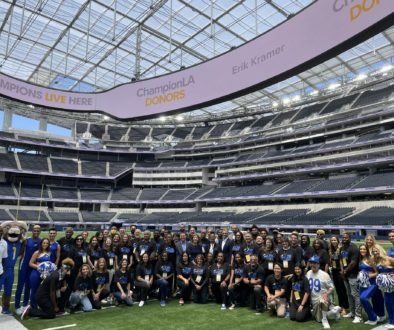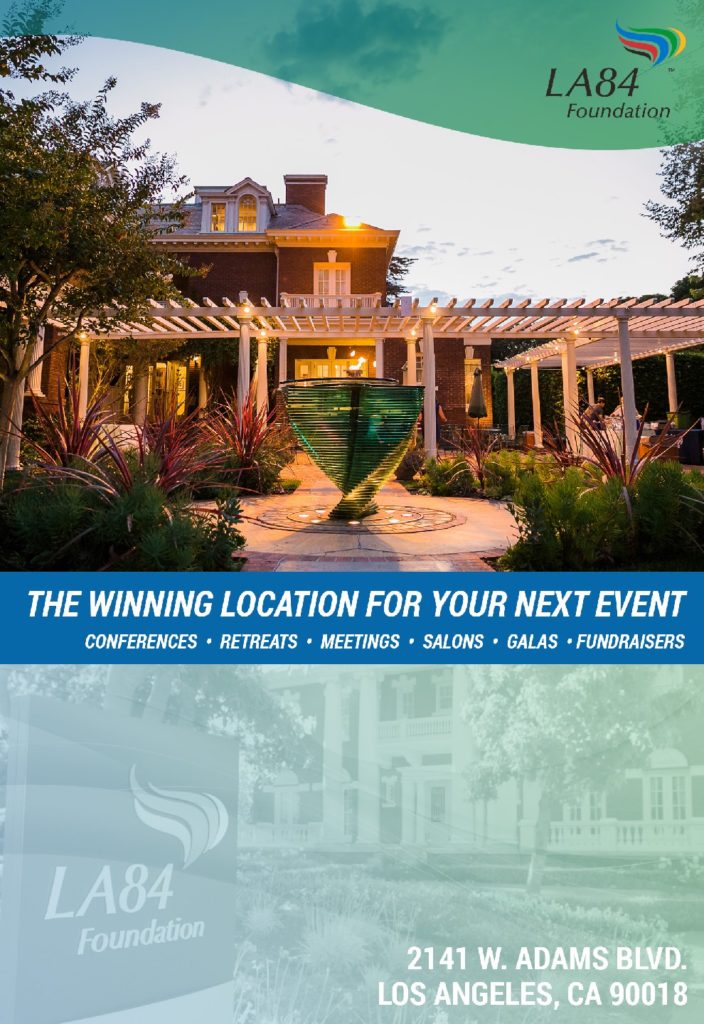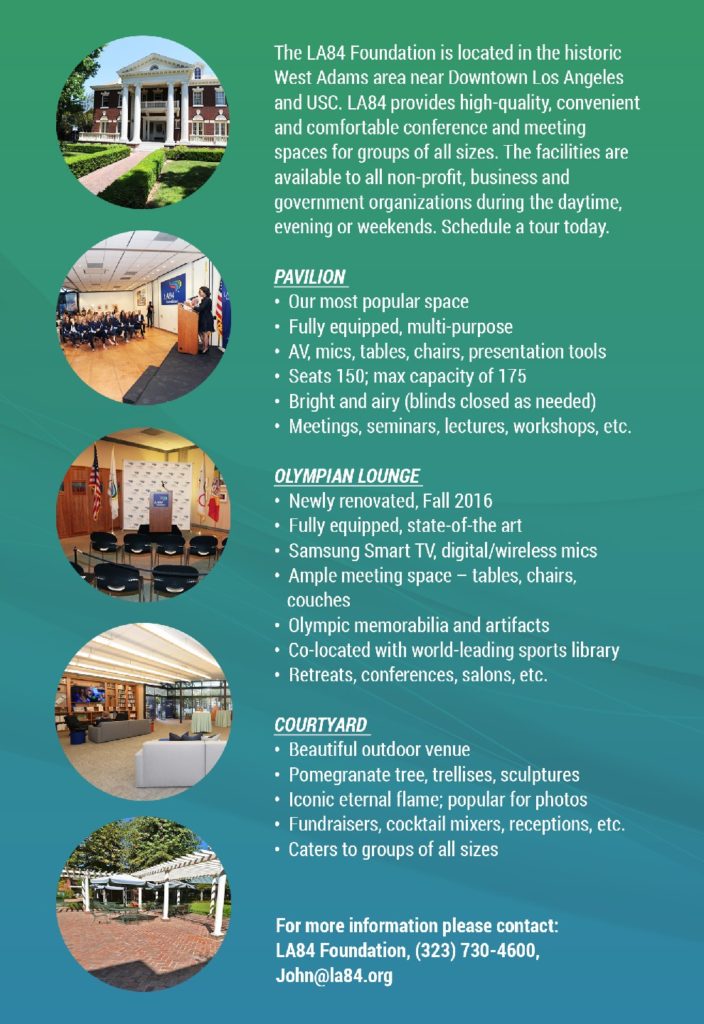A Londoner’s Take on the 2012 LA84 Foundation Summit
Paul Bower attended the recent LA84 Foundation Summit. He writes here about the experience. Bower is the Senior Project Manager of the Legacy 2013> Fund, a freelance consultant and a keen all-weathers open-water swimmer.
From London to LA – What is 5,347 Miles Between Friends?
It was my first trip to LA. My only previous experience of the USA was a trip to New York (loved it) and Detroit (great people but the Motor City in January was quite a challenge). My journey to the West Coast started eight months ago. Between 2008-11 I ran a campaign in the UK called The Big Opportunity which linked not-for-profit-organizations like Rotary International, Scouts, Girl Guides, Youth Clubs, the Women’s Institute and disability groups to the opportunities presented by the London 2012 Olympic and Paralympic Games.
As part of my work I did some research on the social legacy of previous Games. In 1991 I worked on the preparations for the Barcelona Games as an interpreter. In 1994 I wrote my thesis on their economic and social impact. As a result I understood that Olympic legacy was a mixed bag. Not every host city had enjoyed the benefits that had accrued to the capital of Catalonia and Spain’s great Mediterranean port. In the summer of 1984 I was working in Spain. I still have fond memories of sitting in a workmen’s café watching Etta James sing the “When the Saints Go Marching In” and a man arriving on the field of play on a jet pack. LA also gave the world some priceless sporting memories.
- Carl Lewis, equalling the 1936 performance of Jesse Owens by winning four gold medals;
- Edwin Moses winning the gold medal in the 400m hurdles 8 years after winning in 1976;
- Nawal El Moutawakel of Morocco taking the podium as the first female Olympic champion from a Muslim-majority nation;
- Gabi Andersen-Schiess, stumbling through the final lap of the marathon suffering from heat exhaustion, but determined to finish her race and be the best that she could be;
- Sebastian Coe crossing the line to become the first man to win consecutive gold medals in the 1500m.
It wouldn’t be America without show business and you didn’t let us down. Dozens of white grand pianos and Lionel Ritchie bringing the stadium to its feet at the closing ceremony with an extended version of his dance anthem “All Night Long”. It’s still a classic.
I continued my research. I knew that the Los Angeles 1984 Summer Olympics had been the most financially successful of all time. What came as a total surprise was your success story after the show had left town. Twenty-eight years later and the LA84 Foundation was still keeping the flame alive, bringing sport and joy to young people who otherwise might miss out. The LA84 Foundation had survived market crashes, dot com boom and bust, and two recessions to provide sporting opportunities to Angelinos who were not even born when the Games were staged in their city. Now that’s a gold-plated legacy.
So the question popped in my head: “Why can’t we do something as inspirational in London? Or are we just too English?”
I was certain that London 2012 would leave a legacy of urban regeneration and world-class venues. However, the promised legacy of increased participation in community sport would prove more difficult to deliver at a time of economic recession. Realizing Seb Coe’s vision that London 2012 would “inspire young people to choose sport wherever they live, whatever they do, whatever they believe” would prove more difficult than building and operating venues in legacy mode.
I then wrote a paper which argued that the LA84 Foundation, with its model of an endowed fund and independence from political interference, could offer London a guide to achieving a legacy that did not just inspire a generation – but many generations to come. I suggested that we should lobby the Government to release funds to establish a foundation in London to support organizations changing lives and transforming communities through the power of sport as a legacy of our Games. Following the release of that paper I was then employed by a consortium of charitable funders including Comic Relief and the City of London to conduct the research, write the feasibility study and make it happen.
After I waxed lyrical about the LA84 Foundation at a meeting, my boss suggested that I should call the Foundation and try to establish a dialogue. I made the call and librarian Michael Salmon picked up. I often think that the nature of an organization is encapsulated by the first person you talk to. Michael was open, helpful and intelligent, patiently listening to what this stranger from London had to say. He pointed me in the right direction – to Vice President of Grants and Programs Patrick Escobar.
My conversations with Patrick established a relationship which culminated in him endorsing our plans, sharing information and arranging for Anita DeFrantz to speak at the launch of the Legacy 2013> Foundation feasibility study. I scheduled the launch for late July just before the opening of the London Games. We greatly appreciated Anita’s support because as a member of the IOC she had a pretty crowded diary that week. Anita spoke eloquently about the difficult times as well as the successes of the last 28 years. When we asked the audience whether we should plough on ahead with our plan to lobby the UK Government to establish something similar in the UK the answer from the floor was a resounding YES. To increase our joy Edwin Moses showed up so we had a bit of a Summer of ’84 reunion.
Four months later and I was in Los Angeles for the 2012 LA84 Foundation Summit. Some colleagues had wondered why I was flying nearly half-way round the world for a one-day conference. Wasn’t the American social and sporting context completely different? My answer was that sometimes you need see things with your own eyes and talk to the people on the ground. Why stare into the crystal ball when you can read the book?
During the Summit I was struck by the similarities between the situation in Southern California and London. Notwithstanding the glorious November sunshine I could have been East London because so many similar themes emerged.
Just as in the UK, Californian parents anxious for their children’s future wanted them to concentrate purely on academic studies – particularly Maths, English and Science. Many parents, particularly those in middle- and lower-income groups with children in the public rather than the private system saw sport as a distraction from real study.
Speakers repeatedly referred to the myth of the “dumb jock”, when in fact a large proportion of young people participating in sport at school or after school improved their academic performance. We don’t use the expression “jock” in the UK, but the same misconception that physical fitness or athletic prowess and an enquiring mind are not compatible still persists in the UK.
This misconception is amplified at high-school level where principals are under pressure to deliver results which focus on a narrow band of academic success in Maths, English and Science, or face dismissal. As a result, timetable space for sport is reduced in LA and London. The reality is that this strategy is more likely to impact negatively on academic performance as well as the social development of young people.
Conference speakers pointed out that these misconceptions survived despite over 50 years’ research to show that participation in sport can help improve academic attainment. Cuts in public spending in California have contributed to a decline in inter-scholastic sport among young people in public education. The same applies across the UK as schools struggle to cover the cost of team transport. Private schools or state-funded schools situated in wealthier areas whether it is Beverly Hills or Kensington have access to funding streams from wealthier parents to keep up levels of sports provision. In these areas participation is holding up much better.
After the London 2012 Games, the Sutton Trust conducted research which found that more than a third of British medal winners were from private schools, which educate just 7% of the UK school population. If the present misguided cuts in spending on youth sport continue, that trend is likely to increase on both sides of the Atlantic.
So how do we create a political consensus against cuts in youth sport provision?
I believe there are two key issues.
First, we need to demonstrate to policy makers that cutting funding for community sport programmes is likely to increase public spending in the short and medium term as well as the long term. The message must be that cuts can be counter- productive and adversely impact on the public finance balance sheet. I believe that we should concentrate on publicizing where sports interventions could be shown to have an impact within a 2-4 year political cycle. I have little faith that politicians Red or Blue, British or American could be persuaded to take the long view.
Secondly, we need to demonstrate to parents and carers that sport (and maybe physical activity – my dyspraxic 15-year-old daughter hates team sports, but loves abseiling, or rappelling) is a core part of your child’s education. It is not the icing on the cake. It is a fundamental ingredient of the cake. It builds character, but also aids concentration and instils self- discipline.
Then we need to tell a compelling story about the power of sport in plain language with a unified jargon-free message. To paraphrase the great Harvard economist J.K Galbraith: “There is no concept in the field of sport and education that is so complex that it cannot be explained in plain language to an educated lay person.”
This issue was brilliantly articulated at the conference by Paula Berezin, President of Social Capital Partnerships. She identified communications and messaging as a central problem. The community sports sector has the research evidence and academic language to support its case. What is does not yet have is a unified consumer-facing message and a compelling story to tell.
I believe this is where commercial partners/sponsors and their advertising agencies might be able to help get our message across. Often we will look to brands such as Nike and Samsung purely for financial support. However, in this context they have something even more valuable to offer – the power of persuasion. Brands and their agencies have experience in encouraging people to change behaviours. Harnessed to make the case for youth sport on a global scale this could shift the paradigm in an age of austerity. This then begs the question “who could co-ordinate that message?”
There is only one global organization with the reach, the power and the reputation to take up that challenge; The International Olympic Committee. There are probably a thousand reasons why this could never happen, but this is my contribution to the debate. The last thing we need is a new campaigning organization in a cluttered field that is already awash with campaigns, concept brands and confusing language. Billions of people love the games and trust the Olympic rings. It is part of our global DNA.
After the conference I got to see a little of Los Angeles thanks to a friend who lives in Torrance. Burrito lunch, Venice Beach, Hollywood Sign followed by a corned beef sandwich at Musso and Frank. As a keen open-water swimmer my favourite moment was a plunge in the wild Pacific Ocean. It was a beautiful sunny day and I commented that I could not understand why Redondo Beach was empty. My friend said that most Californians would consider it too cold to swim in November. My advice is, “Try it guys. It’s refreshing, great for the circulation and if you do it twice a week, you stop feeling the cold.”
Flying out of LAX I looked back on your city with fond memories of the Summit and the friends I had made. I think my favourite part was the keynote speech from University of Southern California Athletic Director Pat Haden. A brilliant student, successful entrepreneur and accomplished athlete he is the kind of American that we Brits think only exists in the movies. Darn it, he was even funny! Pat’s incisive comments on the relationship between learning and sport brought back personal memories of another Californian and alumni of USC, my old friend Matt Carney.
Matt played college football, ran sprints and studied at UCS in the early 1940s. He enlisted in the Marine Corps directly after graduation. Matt made it back from Iwo Jima although many of his USC buddies did not. He went on to study philosophy at the Sorbonne, spending most of his life away from the USA. He described himself as a Peripheral American. He a man who could discuss the finer points of Sufism and Joe DiMaggio’s batting average. On brisk jogs through the Jardin Luxembourg, with me panting behind, he would hold forth on the real meaning of “leisure”. This was the Greek concept of improving the mind and body and joining the contemplative and the active life, not slumping in a chair channel surfing with a bag of potato chips in your hand.
He would have been right with us at the Summit cheering on the work of his fellow Californians and USC alumni.
So thank you LA84 Foundation. You are the kind of people who make America great. You have given the world an inspirational and practical example of how best to deliver an Olympic legacy. Let’s hope that other host cities and not just London can follow suit.
Paul Bower, 14 December 2012
Paul Bower can be contacted at: paulbowerlondon@hotmail.com
Press Contact:
Wayne Wilson
LA84 Foundation
wwilson@la84foundation.org
323-730-4640




